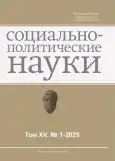Comparative analysis and types of interaction of foreign policy strategies of modern states
- Авторлар: Vavilov A.N.1
-
Мекемелер:
- Diplomatic Academy of the Ministry of Foreign Affairs of the Russian Federation
- Шығарылым: Том 15, № 1 (2025)
- Беттер: 82-90
- Бөлім: International Relations, Global and Regional Studies
- URL: https://journal-vniispk.ru/2223-0092/article/view/313358
- DOI: https://doi.org/10.33693/2223-0092-2025-15-1-82-90
- EDN: https://elibrary.ru/HVELNW
- ID: 313358
Дәйексөз келтіру
Аннотация
In modern conditions, the task of comparative analysis and identification of correlation models of foreign policy strategies of modern states remains relevant. One of the ways to solve it is connected with the consideration of foreign policy strategies in coordinate systems of systemic qualities and conflict inherent in international relations. From the point of view of a systematic approach, the foreign policy strategies of modern states can be divided depending on the level of goal-setting (the scale of goals may involve the implementation of strategies at the level of the entire system of international relations, as well as its subsystems or individual actors), as well as based on the nature of their impact on the structure of international relations (they may be aimed at changing or preserving it). Based on the modern interpretation of the phenomena of international conflict and conflict, it seems possible to identify several models of correlation or interaction of foreign policy strategies of modern states. In particular, it is proposed to consider conflict, confrontational, neutral and cooperative models as such models. In the interests of a comparative analysis of foreign policy strategies, the use of such a characteristic of international conflicts as “asymmetry” may be justified. The asymmetric nature of foreign policy strategies can manifest itself in the asymmetry of goals, means of achieving them, as well as threats.
Толық мәтін
##article.viewOnOriginalSite##Авторлар туралы
Andrej Vavilov
Diplomatic Academy of the Ministry of Foreign Affairs of the Russian Federation
Хат алмасуға жауапты Автор.
Email: an_vavilov@mail.ru
SPIN-код: 6920-1786
Scopus Author ID: 57203132152
Cand. Sci. (Polit.), trainee
Ресей, MoscowӘдебиет тізімі
- Baryshnikov D.N. Conflicts and world politics. Moscow: AST Moscow; East-West, 2008. P. 149.
- Giddens E. Sociology: Textbook of the 90s. Ref. ed. Chelyabinsk, 1991. P. 261.
- Dojch M. Conflict resolution (constructive and destructive processes). Soc.-polit. Journal. 1997. No. 1. Pp. 202–217. (In Rus.)
- Kremenyuk V.A. International conflicts: Problems of management and control. Moscow: ISKRAN, 2006. P. 76.
- Lebedeva M.M. Political conflict resolution: Approaches, solutions, technologies. Moscow: Aspect Press, 1997. P. 47.
- International conflicts. V. Gantman (ed.). Moscow, 1972. P. 41.
- Pozdnyakov E.A. Foreign policy and interstate relations. Moscow: Nauka, 1986.
- Pozdnyakov E.A. A systematic approach and international relations. Moscow: Nauka, 1976.
- Problems of American Studies: Conflicts and crises in international relations: Problems of theory and history. Materials of the Association for the Study of the USA. Moscow: MAX Press, 2001. Issue 11. P. 279.
- The process of formation and implementation of the foreign policy of capitalist states. V.I. Gantman (ed.). Moscow, 1981. P. 250.
- Sushencov A. The political strategy of the United States in international conflicts of the 2000s (using the example of the situation in Afghanistan and Iraq). Dis. ... of Cand. Sci. (Polit.). Moscow, 2010. P. 28.
- Hrustalev M.A. Analysis of international situations and political expertise: Studies. Handbook for universities Moscow: Aspect Press, 2015. P. 185.
- Aron R. Paix et Guerre entre les nations. P., 1966. P. 343.
- Boulding K. Conflict and defence. A general theory. NY., 1963. P. 5.
- Coser L. Function of social conflict. Glencoe, 1956. P. 3.
- Galtung J. A structural theory of aggression. Journal of Peace Research. 1964. No. 2. Pp. 95–119.
- Mitchell С. Asymmetry and strategies of regional conflict reduction. In: Cooperative security: Reducing Third World Wars. I.W. Zartman, V.A. Kremeniuk (eds.). NY.: Syracuse University Press, 1995. P. 26.
- Muck A. Why big nations lose small wars: The politics of asymmetric conflict. World Politics. 1975. Vol. 27. No. 2. Pp. 175–200.
- Rosenau J. Pre-theories and theories of Foreign Policy. In: Approaches in comparative and international politics. B. Farrell (ed.). Evanston, IL: Northwestern University Press, 1966. Pp. 27–93.
- Waltz K. Man, the state, and war. NY.: Columbia University Press, 1959. 263 p.
Қосымша файлдар








